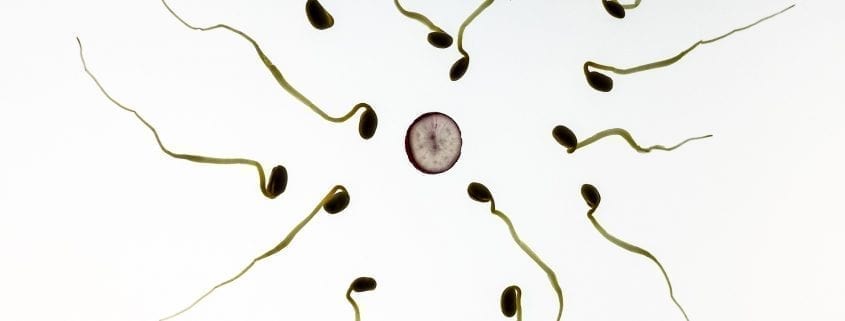Often we see the ladies taking the reins when it comes to getting in shape for baby making; eating healthily, seeing specialists, and taking vitamins and herbs, but research shows us that this approach is just as important for the guys as it is for the girls.
When couples present to fertility clinics for assistance with reproduction, the male factor accounts for 50% of cases of infertility (often there is an issue with both parties). More often than not, couples are referred for IVF in the hope that if the sperm can just get there and meet the egg, fertilisation will occur and the couple will get a lovely baby. What we know from experience is that we need good health and strong sperm whether using IVF or natural fertility methods. In addition, we need to keep in mind that when we make a baby, we are passing on our DNA to that baby and the healthier the mother and the father and their sperm and egg, the better chance of conception and the better chance of a healthy baby – which is the real end goal.
Male factor infertility can manifest as:
- Decreased sperm number
- Decreased sperm quality (poor shape or ability to swim)
- Increased DNA fragmentation
- Immunological factors (sperm clumping)
These issues with sperm have been linked to:
- Structural issues such as varicocoeles (varicose veins of the testes)
- Infections (herpes virus for example)
- Poor testosterone production (often due to stress or nutrient insufficiencies)
- Damage to the sperm due to heat (hot tubs, sitting for long periods of time, riding a bicycle, wearing tight underpants), time (infrequent ejaculation) and age (yes, age affects you guys too!)
- Poor nutrition – too many processed foods, not enough fresh fruit, vegetables and fish
- Exposure to toxic metals and environmental pollutants
So what can we do to fix it?
For both men and women we suggest a minimum of 3 months preconception care to detoxify the body from pollutants, build nutritional status and balance fertility hormones. This is best done with the assistance of your fertility-trained naturopath with the guidance of a semen analysis and blood testing. To get you started though, you can embark on a sperm-friendly diet and lifestyle inducing the following:
- Get yourself some loose boxers and go free as often as you can
- Ditch the bike for another sport that doesn’t cause your testes to sit up so close to your body and heat up
- Include in your diet:
- Brazil nuts (3-4/d) – these are high in selenium which is essential for good sperm health and acts as an antioxidant in the body;
- Walnuts – 75g/d has been shown to improve sperm vitality, motility and morphology over 12 weeks;
- Pumpkin seeds – animal studies support the use of pumpkin seeds for improving sperm quality, contain a good amount of zinc for testosterone production – they are also very good for prostate health
- 5 serves of vegetables and 2 pieces of fruit every day. Often we think that we are getting enough fruit and vegetables, but when we actually look at our diets, we find that we are not getting enough. Make a habit of counting your fruit and vege serves every day and boosting up your dinner with extra vege if you have not had enough during the day. A whole foods, fruit and vegetable based diet is associated with better sperm health.
- Avoid processed foods especially deep fried foods and processed meats. Intake of these foods is linked with lower sperm parameters.
- Include fish in your diet 1-2 times weekly. Regular fish consumption is associated with better sperm health and fertility outcomes. Remember to avoid the larger fish as they bioaccumulate mercury and other toxins from the ocean and choose fish from as clean waters as possible.
- Switch to organic fruit and veges – reducing your intake of pesticides through your diet will reduce your overall toxic load and improve sperm quality. Sperm levels of toxins and pesticides are directly associated with poorer sperm health.
- Frequent ejaculation – yep, that’s a real prescription! ‘Cleaning the pipes’ every 2 days is recommended for improved sperm health.
- Have a chat to your fertility specialist naturopath for a deeper dive into your reproductive health. Naturopathic, nutritional and herbal medicine has many treatments proven to assist with improving sperm health and male fertility.



